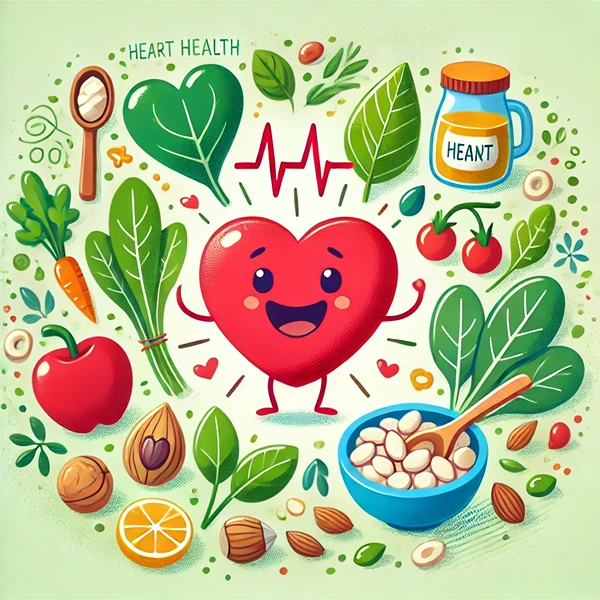
The Benefits of a Plant-Based Diet for Your Health
In recent years, the popularity of plant-based diets has skyrocketed. People are becoming more aware of the connection between what they eat and how they feel, both mentally and physically. This has led many to explore the benefits of a plant-based diet for their health. By focusing on fruits, vegetables, legumes, nuts, and grains, this way of eating offers a wide range of benefits that can positively impact your overall well-being.
A plant-based diet isn’t just about eliminating meat; it’s about embracing the power of plants to fuel your body. Whether you’re looking to lose weight, improve your heart health, or reduce the risk of chronic diseases, a plant-based diet might be the key to achieving your health goals.
What is a Plant-Based Diet?
A plant-based diet emphasizes whole, unprocessed foods derived from plants. This includes a variety of fruits, vegetables, whole grains, nuts, seeds, and legumes. Unlike vegetarian or vegan diets, which strictly avoid animal products, a plant-based diet allows for some flexibility. It focuses on maximizing the intake of plant-based foods while minimizing or eliminating animal products.
The goal is to base your meals around nutrient-dense, plant-derived foods, which are packed with vitamins, minerals, fiber, and antioxidants. These nutrients are essential for maintaining good health and preventing disease.
Why Consider a Plant-Based Diet?
One of the main reasons people turn to a plant-based diet is its potential to improve health outcomes. The focus on whole foods and the reduction of processed foods can lead to numerous health benefits. But what exactly makes a plant-based diet so beneficial?
The answer lies in the power of plants. By consuming a diet rich in fruits, vegetables, and other plant-based foods, you’re fueling your body with the nutrients it needs to function optimally. From better heart health to improved digestion, the benefits of a plant-based diet are wide-ranging.
Heart Health: Can a Plant-Based Diet Lower Your Risk?

Heart disease is one of the leading causes of death worldwide. However, research has shown that a plant-based diet can significantly reduce the risk of heart disease. How? By focusing on whole, plant-based foods, you’re consuming less saturated fat and cholesterol, which are commonly found in animal products.
Plant-based diets are rich in fiber, antioxidants, and healthy fats, all of which contribute to better heart health. Studies have found that individuals who follow a plant-based diet have lower blood pressure, lower cholesterol levels, and a reduced risk of heart disease.
Stats:
According to the American Heart Association, following a plant-based diet can reduce the risk of cardiovascular disease by up to 31%.
Can a Plant-Based Diet Help You Lose Weight?
Weight loss is a common goal for many, and a plant-based diet can be an effective way to shed those extra pounds. Plant-based foods are typically lower in calories but higher in nutrients, which means you can eat more while consuming fewer calories. This can lead to weight loss without feeling deprived.
Additionally, plant-based diets are high in fiber, which helps keep you full longer. This can reduce the temptation to snack on unhealthy foods and can lead to a lower overall calorie intake.
Helpful Hint:
Incorporate a variety of colorful fruits and vegetables into your meals to ensure you’re getting a wide range of nutrients. The more colorful your plate, the better!
Plant-Based Diet and Diabetes: What’s the Connection?
Diabetes is a growing health concern worldwide, but a plant-based diet may offer some protection. Research has shown that individuals who follow a plant-based diet have a lower risk of developing type 2 diabetes. This is largely due to the diet’s emphasis on whole, unprocessed foods that are low in sugar and refined carbohydrates.
By focusing on plant-based foods, you can better control your blood sugar levels and reduce the risk of developing diabetes. Additionally, a plant-based diet can help manage diabetes if you already have it, by improving insulin sensitivity and aiding in weight management.
How Does a Plant-Based Diet Impact Your Gut Health?
Your gut health plays a crucial role in your overall well-being, and a plant-based diet can have a positive impact. The fiber found in plant-based foods is essential for maintaining a healthy gut. It promotes regular bowel movements and feeds the beneficial bacteria in your gut, which supports a healthy digestive system.
A healthy gut is linked to improved immunity, better mental health, and even a reduced risk of chronic diseases. By focusing on plant-based foods, you’re supporting your gut health and, in turn, your overall health.
Can a Plant-Based Diet Improve Mental Health?
Mental health is just as important as physical health, and what you eat can have a significant impact on your mood and mental well-being. A plant-based diet, rich in nutrients like omega-3 fatty acids, B vitamins, and antioxidants, can help improve mental health by reducing inflammation and supporting brain function.
Studies have shown that individuals who follow a plant-based diet report lower levels of anxiety, depression, and stress. This may be due to the diet’s emphasis on whole foods that are free from the additives and preservatives found in many processed foods.
What About Bone Health? Can a Plant-Based Diet Provide Enough Calcium?
One common concern about plant-based diets is whether they provide enough calcium for strong bones. The good news is that a well-planned plant-based diet can meet your calcium needs. Many plant-based foods, such as leafy greens, tofu, and fortified plant milks, are rich in calcium.
In addition to calcium, vitamin D is crucial for bone health. While it’s important to get enough calcium from your diet, it’s also essential to spend time in the sun and consider a vitamin D supplement if necessary.
Environmental Impact: How a Plant-Based Diet Supports Sustainability
Beyond the personal health benefits, a plant-based diet can also have a positive impact on the environment. The production of plant-based foods generally requires fewer resources, such as water and land, and generates less greenhouse gas emissions compared to the production of animal-based foods. By choosing plant-based options, you’re contributing to a more sustainable food system.
Livestock farming is a major contributor to environmental issues like deforestation, water pollution, and habitat destruction. In contrast, growing plants for food tends to be less damaging to the environment. This makes a plant-based diet an eco-friendly choice that aligns with the goals of reducing our carbon footprint and preserving natural resources for future generations.
Stats:
A study published in Science found that adopting a plant-based diet could reduce food-related greenhouse gas emissions by up to 70% by 2050.
How to Transition to a Plant-Based Diet

Switching to a plant-based diet doesn’t have to be overwhelming. Start by making small changes and gradually increasing the amount of plant-based foods in your diet. Here are some practical tips to help you transition smoothly:
- Start with familiar foods: Incorporate more fruits, vegetables, and whole grains that you already enjoy into your meals.
- Experiment with plant-based recipes: Try new recipes that feature plant-based ingredients to discover new favorites.
- Make plant-based swaps: Replace animal products with plant-based alternatives, like using almond milk instead of dairy milk or tofu instead of chicken.
- Plan your meals: Planning your meals in advance can help you stay on track and ensure you’re getting a balanced diet.
- Listen to your body: Pay attention to how your body feels as you transition to a plant-based diet, and adjust your eating habits accordingly.
Common Myths About Plant-Based Diets: What You Need to Know
There are many misconceptions about plant-based diets that can make people hesitant to give them a try. Let’s debunk some of the most common myths:
Myth 1: You Can’t Get Enough Protein on a Plant-Based Diet
This is one of the most common concerns, but the truth is that you can get plenty of protein from plant-based sources. Foods like beans, lentils, tofu, quinoa, and nuts are all excellent sources of protein. As long as you’re eating a variety of these foods, you’ll be meeting your protein needs.
Myth 2: Plant-Based Diets Are Expensive
Another myth is that eating a plant-based diet is more expensive than a traditional diet. While some specialty products can be pricey, plant-based staples like grains, beans, and seasonal vegetables are often more affordable than meat and dairy products. Planning your meals and buying in bulk can also help you save money.
Myth 3: Plant-Based Diets Are Boring
Some people think that a plant-based diet means giving up flavorful and satisfying meals, but that’s far from the truth. There are countless delicious plant-based recipes available, and many traditional dishes can be easily adapted to be plant-based. With a little creativity, your meals can be just as tasty and varied as before.
Nutritional Considerations: What to Watch Out For
While a plant-based diet can be very healthy, it’s important to pay attention to certain nutrients that might be harder to obtain from plant-based sources. Here are a few nutrients to keep an eye on:
- Vitamin B12: This vitamin is primarily found in animal products, so if you’re following a strict plant-based diet, you may need to take a B12 supplement or eat fortified foods.
- Iron: Plant-based sources of iron include lentils, chickpeas, and spinach. Pairing these with vitamin C-rich foods can help improve iron absorption.
- Omega-3 Fatty Acids: Flaxseeds, chia seeds, and walnuts are good sources of plant-based omega-3s. Consider a supplement if needed.
- Calcium: As mentioned earlier, leafy greens, fortified plant milks, and tofu can provide adequate calcium.
- Protein: Ensure you get enough protein by including a variety of beans, legumes, nuts, seeds, and whole grains in your diet.
Helpful Hint:
Consult with a nutritionist or dietitian when transitioning to a plant-based diet to ensure you’re meeting all your nutritional needs.
Key Nutrients and Their Plant-Based Sources
| Nutrient | Plant-Based Sources | Importance |
|---|---|---|
| Protein | Beans, Lentils, Quinoa, Tofu, Tempeh, Nuts | Builds and repairs tissues, supports immune function |
| Iron | Spinach, Lentils, Chickpeas, Pumpkin Seeds | Essential for blood production, energy levels |
| Calcium | Tofu, Almonds, Kale, Fortified Plant Milks | Supports bone health, nerve function |
| Omega-3 Fatty Acids | Flaxseeds, Chia Seeds, Walnuts, Algal Oil | Supports heart health, brain function |
| Vitamin B12 | Fortified Cereals, Nutritional Yeast, Supplements | Essential for nerve function, red blood cell formation |
Social Considerations
One challenge of adopting a plant-based diet is navigating social situations where plant-based options may be limited. Whether it’s a family gathering, a dinner party, or eating out at a restaurant, here are some tips to help you stay on track:
- Communicate your dietary preferences: Let your host or the restaurant staff know about your dietary choices in advance, so they can accommodate you.
- Bring a plant-based dish: If you’re attending a potluck or family event, bring a dish that you can eat and share with others.
- Research restaurant menus: Many restaurants offer plant-based options or are willing to make substitutions. Check the menu online before you go.
- Focus on what you can eat: Rather than feeling restricted, focus on the delicious plant-based foods that are available to you.
How to Maintain a Balanced Plant-Based Diet
Maintaining a balanced plant-based diet involves more than just eating fruits and vegetables. It’s about ensuring that you’re getting all the necessary nutrients in the right amounts. Here’s how to keep your diet balanced:
- Eat a variety of foods: Include a wide range of fruits, vegetables, whole grains, nuts, seeds, and legumes in your diet.
- Watch your portions: Even plant-based foods can contribute to weight gain if eaten in large quantities, so be mindful of portion sizes.
- Stay hydrated: Drink plenty of water throughout the day, as it helps with digestion and keeps your body functioning properly.
- Monitor your nutrient intake: Use a food diary or a nutrition app to track your intake of key nutrients like protein, iron, and calcium.
FAQs
Wrapping Up
A plant-based diet offers numerous health benefits, including better heart health, weight management, and improved gut health. By focusing on whole, nutrient-rich plant foods, you can support your body’s overall well-being and reduce the risk of chronic diseases. Whether you’re looking to transition to a plant-based diet for personal health reasons, environmental sustainability, or ethical considerations, the key is to start by incorporating more plant-based meals into your daily routine. The flexibility and variety available in a plant-based diet make it a sustainable choice for many people. Remember, it’s not about being perfect; it’s about making choices that align with your health goals and lifestyle. Keep exploring the wide range of delicious plant-based foods, and enjoy the positive impact they can have on your life.
